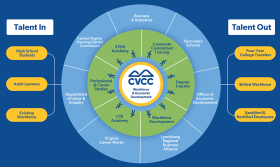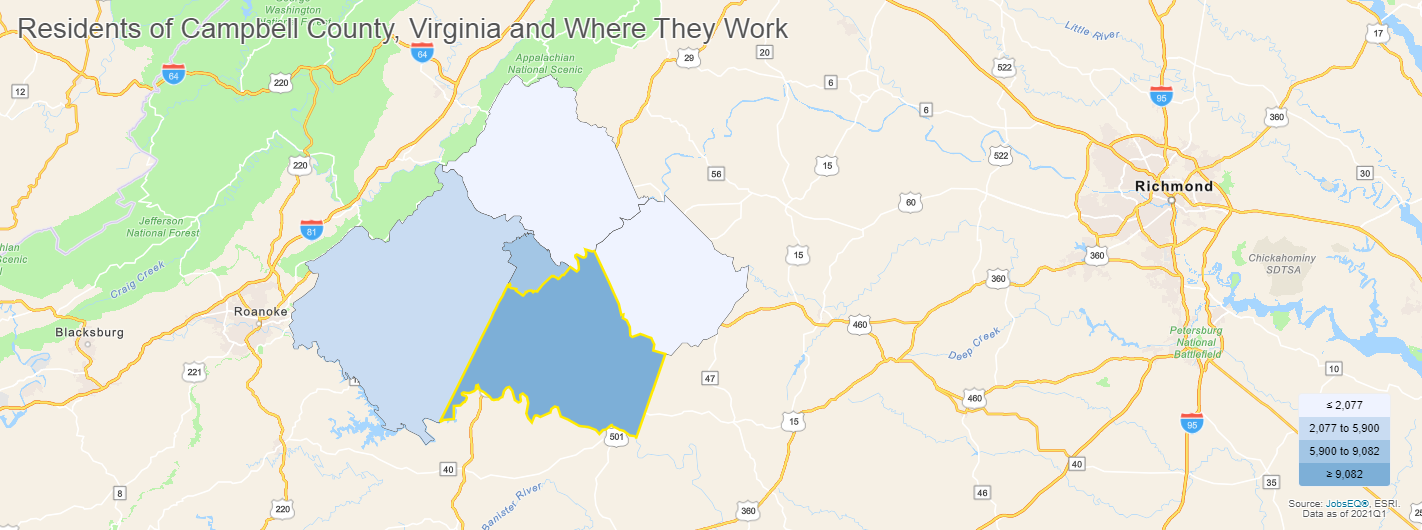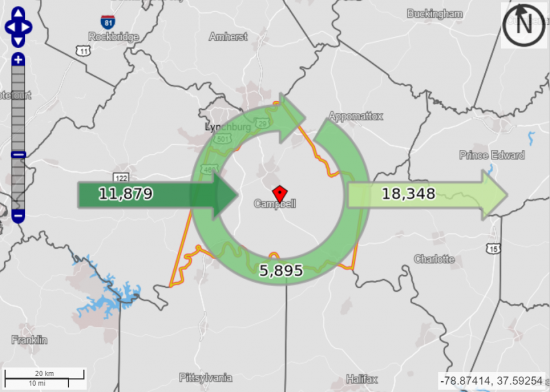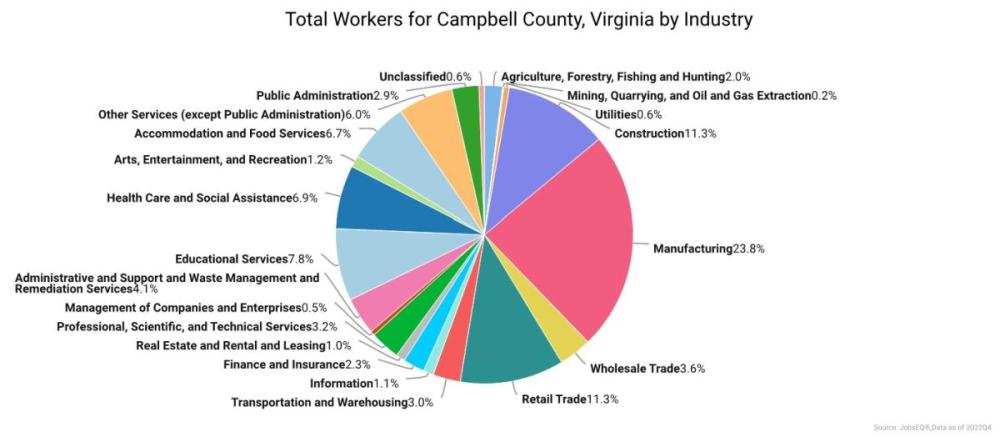Workforce
With education and technical options around the region, Campbell County offers a pipeline of skilled workforce covering a variety of industry sectors. In addition to education opportunities, Campbell County collaborates with regional partners, such as Virginia Career Works, to assist in workforce training and solutions. Virginia Career Works provides a vital link between meaningful employment and growing businesses, advancing economic prosperity.
Higher Education and Technical Training
- Campbell County Technical Center is Campbell County Public School's career and occupational training facility offering classes to high school students and adults in ten programs including Electricity, Manufacturing Technology, Auto Technology and Repair, Computer Networking and Repair, Culinary Arts, Cosmetology, and Nurses Aide Education.
- Centra College of Nursing offers four nursing programs: Registered Nurse to Bachelor of Science in Nursing (RN-BSN), Associate's Degree in Nursing (ADN), Practical Nursing Program (PN), and Nurse Aide Education Program. Graduates function as effective members of healthcare teams applying evidence-based practice through life-long learning.
 Central Virginia Community College's two-year college transfer programs in arts and sciences and in certain pre-professional areas lead to associate degrees and offer courses generally acceptable for transfer to four-year institutions. Its occupational and technical programs lead to diplomas, certificates, or associate of applied science degrees and are designed to prepare individuals for certain professions. Its other programs, including developmental work, special training for industry, and community service, offer instruction commensurate with the needs of individuals, groups or the general public.
Central Virginia Community College's two-year college transfer programs in arts and sciences and in certain pre-professional areas lead to associate degrees and offer courses generally acceptable for transfer to four-year institutions. Its occupational and technical programs lead to diplomas, certificates, or associate of applied science degrees and are designed to prepare individuals for certain professions. Its other programs, including developmental work, special training for industry, and community service, offer instruction commensurate with the needs of individuals, groups or the general public. - Liberty University offers more than 700 programs in its 15 schools and colleges from the certificate to the doctoral level ranging from medicine, biology, chemistry, and engineering to design, music, religion, law, and more. More than 15,000 attend classes locally on its Lynchburg campus.
- University of Lynchburg educates 1,822 undergraduate and 870 graduate students in 52 undergraduate majors, 67 minors, and 16 pre-professional programs. The university also has 3 doctoral programs and 14 master’s programs. Between 2011-2020, the University of Lynchburg averaged over 250 graduates with completed internships.
- Old Dominion Job Corps is part of the nation's largest free education and job training program for young adults. Job Corps graduates complete 8-24 months of career training programs aligned with industry-based skill standards, nationally recognized certifications, or union apprenticeship programs. Students receive hands-on career training for entry-level positions through work-based learning, internships, and job shadowing opportunities. Programs include automotive and machine repair, plumbing, carpentry, electcrical,healthcare, and homeland security. Students also learn employability skills such as the importance of teamwork, promptness, accountability, dependability, follow-through, and communication.
- Randolph College's rich academic program offers students a choice from 30 majors and 43 minors. The College also offers popular pre-professional programs in engineering, nursing, law, medicine, and veterinary studies.
- Sweet Briar College is one of only two women’s colleges in the U.S. to offer an ABET-accredited engineering degree program and is one of less than 10 percent of U.S. colleges and universities with a Phi Beta Kappa National Honor Society chapter on campus. In 2021, for the second time in three years, Sweet Briar College was named as one of the nation’s Most Innovative Schools by U.S. News & World Report, in recognition of its academic and institutional innovations.
- Virginia Technical Institute provides hands-on training in a variety of fields including electrical, plumbing, heating and air, welding, pipe-fitting, carpentry, masonry, multi-craft industrial maintenance, and project management. Students ranging from high school to adults have the opportunity to earn a journeyman’s license using curricula from the National Center for Construction Education and Research. The Institute is also certified through the State Council of Higher Education for Virginia (SCHEV). In 2022, VTI received a grant for a feasability study for a small-scale manufacturing incubator, which would enhance the hands-on training available on campus.
- Virginia University of Lynchburg, one of Virginia's five Historically Black Colleges and Universities (HBCUs), was founded in 1888 and is proud to offer higher education to students who may not have the chance to attend larger traditional universities.
Commuting Patterns for Campbell County

(Source: Chmura JobsEQ Economics & Analytics)
Inflow/Outflow Patterns

(Source: U.S. Census)
Average travel times for Campbell County are typically the same as mileage. For example, a 20 mile distance in Campbell County can typically be driven in 20 minutes.
Industry Snapshot
The largest industrial sector in Campbell County, Virginia is Manufacturing, employing 4,727 workers. The next-largest sectors in the region are Retail Trade (2,277 workers) and Construction (2,152). High location quotients (LQs) indicate sectors in which a region has high concentrations of employment compared to the national average. The sectors with the largest LQs in the region are Manufacturing (LQ = 3.03), Construction (1.91), and Other Services (except Public Administration) (1.43).

Employment data are derived from the Quarterly Census of Employment and Wages, provided by the Bureau of Labor Statistics and imputed where necessary. Data are updated through 2022Q3 with preliminary estimates updated to 2024Q4. (Source: JobsEQ®)

